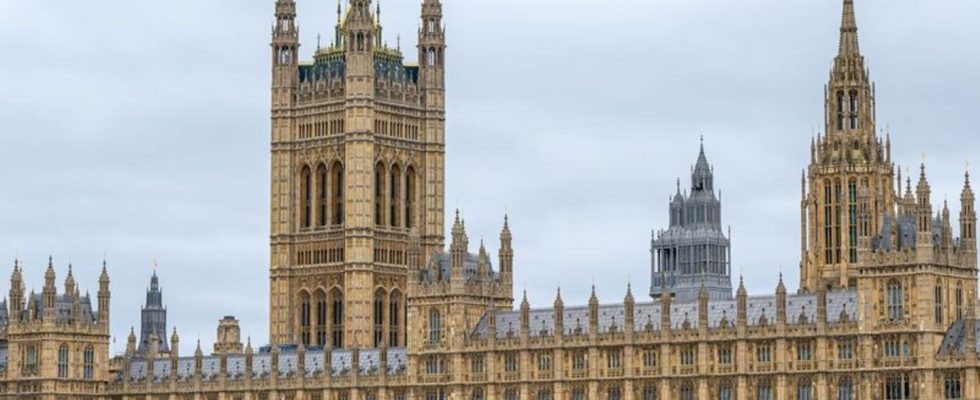Great Britain
British Parliament approves Rwanda deportation pact
The asylum pact with Rwanda stipulates that migrants who entered the country irregularly should no longer be given the opportunity to apply for asylum in Great Britain. photo
© Sina Schuldt/dpa
Prime Minister Sunak is on top: The British Parliament approves deportations of asylum seekers to Rwanda. But the criticism of the “groundbreaking” project is not going away.
Despite harsh criticism, British Prime Minister Rishi Sunak is pushing ahead with his plans for an asylum pact Rwanda moving forward. After weeks of debate, Parliament in London passed a controversial law overnight declaring the East African country a safe third country. This means that asylum seekers who come to the United Kingdom without valid documents can be deported to Rwanda in the future, regardless of their origin.
The Supreme Court in London declared the project illegal just a few months ago. The new law is intended to overturn this ruling.
Sunak recently said the flights should start in ten to twelve weeks. King Charles III The law still has to come into force.
The State Secretary responsible for “illegal migration”, Michael Tomlinson, confirmed to the BBC that victims of torture or human trafficking could also be flown to Rwanda. The African state, which critics accuse of human rights violations, is a safe country, said Tomlinson. The migrants should apply for asylum there. They are prohibited from returning to Great Britain. Human rights experts emphasize that there are no legal routes to Britain for migrants.
Sharp criticism from UNHCR and the Council of Europe
The heads of the UN refugee agency UNHCR and the UN human rights office called on Britain to reconsider the new law and instead take practical measures to combat irregular refugee flows. The legislation breaks with the UK’s long tradition of providing refuge to those in need. It also violates the Refugee Convention, said the UN High Commissioner for Refugees, Filippo Grandi.
Council of Europe Commissioner for Human Rights Michael O’Flaherty said in Strasbourg that the new law raises important questions about the human rights of asylum seekers and the rule of law in general.
The European Court of Human Rights (ECHR), which is part of the Council of Europe, prevented Great Britain from sending asylum seekers by plane to Rwanda in 2022 at the last minute. Prime Minister Sunak announced that he would ignore interim injunctions from the ECtHR in the future. “No foreign court will stop us from starting the flights,” he said on Monday. At the same time, he emphasized that the asylum pact does not conflict with international law.
London sees itself in the right
The conservative British government emphasizes that its plan helps to protect migrants. Vulnerable people would be deterred from traveling in rubber dinghies across the English Channel and the business model of smugglers would be destroyed, said Sunak. Home Secretary James Cleverly emphasized, with a view to French reports of a new fatal accident in the English Channel, that London is doing everything it can to ensure that no one has to put their lives at risk anymore. But experts doubt that the project will deter migrants from crossing.
Sunak spoke of a “groundbreaking law”. Now it’s a matter of getting the deportation flights to Rwanda underway.
There is also criticism in Great Britain that hundreds of millions of pounds of British tax money are paid to Rwanda, but probably only a fraction of the eligible asylum seekers are deported.
Sunak has promised to curb migration and wants to use the crackdown to reduce his Conservatives’ significant deficit in the polls ahead of this year’s general election. However, so far there is little to suggest that Sunak will be able to reverse the trend.
Rwanda: 130,000 refugees have already been offered security
The government in Rwanda welcomed the agreement in the British Parliament. “We are committed to a migration and development partnership with Great Britain and look forward to welcoming the people who will be resettled in Rwanda,” said government spokeswoman Yolande Makolo to the German Press Agency in Kigali.
In the past 30 years – since the 1994 genocide, in which Hutu militias murdered at least 800,000 Tutsi and moderate Hutus in just 100 days – the East African country has worked hard to make Rwanda safe for Rwandans and foreigners, said Makolo. Since then, the country has already taken in 130,000 refugees and is working, for example, with the UN refugee agency UNHCR to offer migrants stuck in Libya a safe place to stay.

